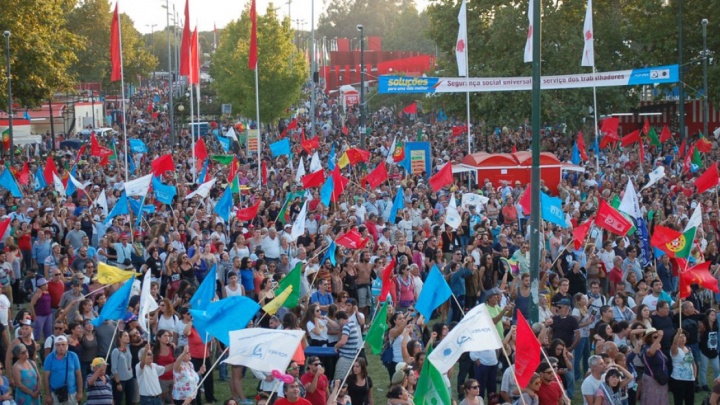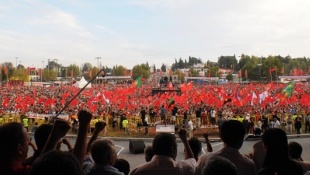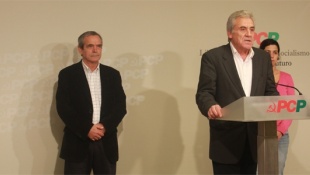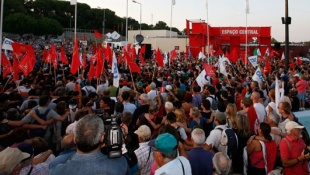Translated "Avante!" article by Albano Nunes, Member of the Secretariat of the CC
With the results of the October 4 legislative elections- where, among other aspects, stand out the defeat and the loss of the absolute majority of the PSD/CDS coalition and the electoral progress of CDU - resulted a different arrangement of political and party forces in the Assembly of the Republic which enables to halt the destructive policy of four years of PSD/CDS government and respond to the pressing problems of the workers and the people.
This new situation did not drop out of the skies. In the first place it is a result of the persistent struggle of the working class and of the popular masses that undermined the PSD/CDS government's support base and led to its defeat at the polls. But it also owes much to a prompt and correct political assessment of the elections by the PCP - countering most analysts and demolishing the scenarios created by the ruling class on election night - and to its political initiative. Acting in accordance with a well-known Marxist axiom - more than explaining reality it is necessary to act to transform it - the Party did not just point the positive aspects resulting from the electoral battle, acted boldly in the new reality, modifying it.
The intervention of the masses and the active role of the PCP were determining for the options of the Portuguese people in the elections to have political and institutional consequences, creating a situation that, somewhat against the dominant international trend, today lives in Portugal, and is a serious blow to the theory of inevitabilities.
1. What was gained
A first and decisive goal has been achieved: the consummation of the PSD/CDS coalition's defeat and of its government, confirmed the day before yesterday with the nomination of the General Secretary of the PS as Prime Minister. It opened up a new phase in the struggle of the workers and the Portuguese people to meet their most heartfelt aspirations.
It will not be, however, an easy way ahead. We would all like that the convergence established between PS, PCP, BE and PEV aiming to ensure that a PS government could take office and "adopt a policy to ensure a lasting solution in terms of the legislature" were broader and more substantial. That which does not depend on the initiative and intervention of the Communists is a lot. There are concerns about the future.
These are legitimate concerns. During contacts, where the issues where it is possible to converge immediately were identified, the differences, which are in fact very big, were not on the table (as indeed we saw during the election campaign itself). But these are concerns that should lead, not to passiveness and being alert, but to a determined intervention by the communists. Only those who give up fighting do not run risks.
In any case, what has been achieved is a lot. Just witness the cries of anger and anti-communist hatred that have been disgorged up by the reaction and the large economic interests and their overwhelming expression in the media which they dominate. Just witness the campaign based on the most false and ridiculous arguments which, with the connivance of the President of the Republic, sought to erase the irrevocable defeat imposed on the PSD/CDS coalition by the struggle, by the vote and the parliamentary rejection and to prevent the entry of PS into government functions.
One can hardly deny the wisdom and determination of the PCP and its political initiative regarding the new institutional framework. By showing, against the current of those who denied the defeat of the PSD/CDS; by demonstrating the decisive value of the composition of the AR and the election of MPs, destroying the falsehood of theses on elections for a prime minister; by the proof made on the value and usefulness of the vote on CDU and the role of the PCP, as a decisive force of resistance and struggle that it prides on being, but also as a party with a project on which you have to rely and which really counts for solutions necessary to the people and country; the practical proof that change is possible, even though it is still far from the necessary change; demonstrating that there are no "inevitabilities" nor "fatalisms" that the struggle of workers and peoples cannot overcome.
The degree of convergence that was reached is what it is. The biggest requirements of political identification placed by an agreement on a government and a government programme could not be met given the acknowledged differences on matters and structural options. But it was possible, as the PCP always said, to ensure the conditions for the formation of a PS initiative government having its own programme. Without attempting to impose its Programme, but without yielding it, the role of the PCP proved to be decisive for the solution found. And (what is fundamental) its MPs are indispensable for a majority in the Assembly of the Republic, which gives sufficient basis for the adoption of measures favourable to the workers, the people and the Country, which has already begun to occur.
These are striking realities that regardless of what comes later, will always count for the creation of a political awareness of the masses and for the advancement of their liberation struggle.
2. The aims of PCP’s intervention
Needless to say that what drives the PCP in its intervention in the new post-election framework is the same as always: the unrelenting defence of the interests and aspirations of the workers and the Portuguese people, supporting all that is favourable to them and firm opposition to all that exploits and oppresses them, never the search for misleading positions of power, not to serve itself but to serve. No, the parties are not “all equal". In this and other relevant aspects the PCP makes a difference, a profound difference, because the Communists are "reliable people" with one face and one word.
Hence, following the situation created after the 4 October elections, interpreting not only the feelings of the overwhelming majority of Portuguese but also the unequivocal meaning of their vote at the polls, the PCP endeavoured to prevent the announced continuation of the PSD/CDS coalition and of the criminal policy that has caused so much suffering to our people, and foster a different governing solution which, although limited in its ends, would meet the most serious and pressing problems of the workers and the people.
This was the reason why we announced the tabling of a motion of rejection of a PSD/CDS government in case the outrageous position of the President of the Republic went ahead (as it did), insisted on the assessment that it only depended on the PS itself to form a government of its own, and open and committed, in contact with the PS, to "identify issues, measures and solutions that could translate an indispensable sign of change."
3. PCP’s position
The position, guideline, and tasks of the PCP in view of the new political framework are obviously those that the Party itself defines and not third-party interpretations generally targeted towards misreading, confusing and even denigrating the true positions of the Party. It is necessary to pay great attention and vigilance in relation to this crucial question, and all the more crucial since we live in a very complex and demanding situation, with truly new aspects where only the essential is assured in advance: the political and ideological independence of the Party, the allegiance to its Programme, the clear affirmation under all circumstances of the class nature and revolutionary identity of the PCP. A party that, as Alvaro Cunhal often stressed "chooses to lose votes by telling the truth, than win them by lying."
If there's anything that can attest the seriousness with which the PCP is in the process with the PS is the clarity with which it assumes its positions, refusing amalgamations and ambiguities, placing the meetings and commitments on a bilateral basis (meetings, signing of the "joint position") or affirming with autonomy its positions (public statements, own motion of rejection), maintaining full reservation on what should be, even with risks of manipulations by the media. In the society we live seriousness has a price. But the PCP is not guided by criteria of obtaining group benefits, does not stand on its toes to appear in the picture, in an empty role. The political and moral authority of the Portuguese communists does not lie on favours from the dominant media (which is hostile to them), it lies in the masses and their support.
On the PCP speaks the PCP and to know what the PCP thinks and proposes, it is essential to go directly to its documents.
The decisions of the Central Committee meetings of October 6 (soon after the elections) and November 8 (two days before the government's overthrow in the Assembly of the Republic) are the fundamental reference points for the guidelines and intervention of the communists. At the same time, it is essential to know the positions expressed in the speeches by the General Secretary (namely on October 7 after the first meeting with the General Secretary of the Socialist Party) and of other Party leaders and a careful reading of the Avante! Without this it is inevitable that distortions propagated by the media may have confused here and there, bringing factors of disturbance that hinder a determined and confident intervention.
4. The “joint position by the PS and the PCP on the political solution”
A key issue is the following: What is the Party's position on a PS government? What is its degree of involvement? What commitments it assumed?
The answer is given by the "Joint position by the PS and the PCP on the political solution" formally signed by the general secretaries of the two parties on November 10 in the Assembly of the Republic and the Declaration by the Political Committee of PCP’s Central Committee made public on the same occasion . No more no less.
It is not therefore a "coalition" or a "programmatic agreement" nor an " agreement of parliamentary incidence'. It is a bilateral understanding, between the PCP and PS, focusing on very specific issues which were identified as common and requiring the most pressing solution, leaving aside issues where there are substantial differences and which will be faced by the PCP honouring the assumed commitments and always concerned with what best serves the interests of the workers, the people and the Country.
Unlike what a certain line of diversion wants, we're not dealing with a "left government" nor an "alliance of the left" or of the "lefts". We have a commitment with concrete and immediate objectives, which has enabled to inflict a major defeat on the PSD/CDS coalition and which, as stated by the "joint position" allows the PS “to form a government, present its government programme, take office and adopt a policy to ensure a lasting solution in terms of the legislature”. Does this mean that in this way the PS gets a “left certificate"? Certainly not according to us. But if the PS chooses to "turn left" the PCP would surely not regret it.
The PCP did not relinquish its Programme. Did not relinquish its struggle for the rupture that is needed after nearly 40 years of right-wing policies and 28 years of European capitalist integration and for a patriotic and left-wing alternative. Did not relinquish any form of intervention beginning with the mass struggle, and its parliamentary intervention will continue as always combined with its action in the companies and on the streets. Did not stop considering, on the contrary, the construction and strengthening of the Party as a permanent and decisive task of the communists.
The commitment of the PCP for the practical implementation of the "joint position" is unquestionable. Despite the deep programmatic differences between the PCP and PS, PCP will do everything that depends on it to make this implementation go as far as possible. But will not allow the 'joint position' to be transformed into what it is not and assigning to the PCP, including by the PS circles or any other party, commitments that it did not assume.
To those who, resorting to all means to prevent the entry of the PS government into functions demanded assurance regarding the legislature, we have to emphasize two aspects: as witnessed by 40 years of political life regarding the durability of the legislatures is not something that is pre-defined in abstract. In these years we have seen governments with absolute majority not coming to the end of a legislature, we have seen minority governments conclude it and governments like the PSD/CDS with a majority support in the AR have only come to the end through the protective hand of Cavaco Silva; Secondly, and most importantly, it was the nature and content of the policy pursued that ultimately dictated the fate and durability of governments.
5. On what the “joint position” does not contain
Highly valorising what has been agreed bilaterally and is set down in the "joint position", PCP neither ignores nor conceals much that is left out given the struggle for the necessary rupture with the right-wing policy carried out for decades by successive governments, including PS governments.
As we have emphasized, we start from very different programmes and options and a recognized and proven divergent view both on the external constraints (the Budgetary Treaty to the attitude concerning the debt) and in terms of addressing the interests of big business (present in the divergent attitude on the national minimum wage and labour legislation or on the taxation of profits and dividends).
But neither party sought to impose its programme, nor in the contacts made were demanded or passed 'blank cheques', which obviously the PCP would never do. It will be the further development of the situation at national, European and global level, and the evolution of the balance of forces in the social and political level in Portugal that will determine when and how new issues will arise to be resolved.
We are aware of the demands that are placed on us and the complexity of issues that arise. We know the level of expectations that exist as to a real change of policy in a framework of recognised limitations, by own choice, of a PS government to answer them. But here the role of the PCP and the action of the masses can determine the materialization of the main aspirations that legitimately most of the Portuguese people want answered.
Without the illusion that we have ahead a path of ease, it is important to focus on the materialization of what is accepted, ensure compliance of what is enshrined in the "joint position", following with great attention and respect popular feelings and aspirations.
And give firm combat against revanchism and anti-communism that are already there in full force in order to prevent the already announced positive measures and to create conditions, with early elections or not, to return PSD/CDS into government. It will be necessary to face operations of intrigue, sabotage and destabilization of all kinds by the forces defeated on November 10 as well as external interferences and pressures with which they will as always be articulated.
The new political situation creates better conditions to continue and intensify the struggle for a real alternative.
6. A step in the right direction
The will to overthrow the PSD/CDS government and reverse the situation of impoverishment and withdrawal of rights was too great. It was seen in the mass struggles, it was seen in the election results, it was seen in the remarkable explosion of joy from the thousands of workers gathered on November 10 near the Assembly of the Republic with the announcement of the reactionary government's defeat and in the shows of affection towards PCP’s leaders and MPs who greeted the protesters.
All this confirms how right PCP's position was in the difficult path followed since the night of the elections results to the signing of the "joint position of the PS and the PCP on the political solution", and how really important is what already has been achieved.
But it is necessary that the joy for the victory achieved does not lose sight of the road ahead for the change that is needed in national life.
It is true that there is a majority in the Assembly of the Republic which converged in a determined and responsible manner to ensure the rejection of the PSD/CDS government programme and can carry far the stated commitment with the interests of the Portuguese people. But this is a minority government of the Socialist Party and not a coalition with concrete objectives agreed - in order "to address the most pressing problems of the Portuguese, employment, wages and incomes, pensions and social benefits, rights, social functions of the State and public services namely health, education, social security and culture "- are important, but are limited to the seriousness of the country's situation.
To the PCP it was and is a step, no doubt very important, but not unheard of or contrary to attitude the PCP always had. Today as in other times in these past 40 years, it was always the PCP that took the initiative to discuss with other political forces, including the PS, solutions that would prevent the decisive advance of the reactionary forces. Life will tell if this was really a "historical" step. But it is certainly a step, however small, in the right direction which is the broader struggle for a rupture with nearly 40 years of right-wing policies and of submission to the dictates of the European Union and imperialism and the restoration of respect for the spirit and letter of the Constitution of the Republic and the ideals of April that it enshrines.
The PCP not only did not abandon its proposal to the Portuguese people of a patriotic and left-wing alternative, but considers that recent developments in the country's situation confirms and reinforces the need to continue and intensify the struggle for its materialization.
7. The struggle continues
The political situation entails a lot of novelty and uncertainty and places to the Party great demands in terms of political and institutional intervention. This cannot however lead to lose sight of the essential: the mass struggle and the strengthening of the Party. The guidelines and tasks defined in meetings the Central Committee meetings of October 6 and November 8 must be present in the activity of the Party organizations at all levels.
The separate and independent action of the Party is fundamental to influence developments in the right direction and in the affirmation and materialization of the Programme, the decisions of the XIX Congress, the analyses and guidelines of the Central Committee. In such a new situation and much misinformation, intrigue and distortion of PCP’s stands, it is even more necessary to promote the explanation and discussion across party organisations, deepen the democratic functioning of the Party, promote the militancy and initiative of every militant .
The time is of the Party's political initiative and intensification of the mass struggle. As we always said, 'defeats do not discourage us and victories do not make us rest”. It is necessary that the expectations and hopes created by the great victory over the PSD/ CDS government and the convergence achieved to make viable a PS initiative government do not create feelings of being alert and passivity instead of encouraging the intensification of the struggle in the companies and on the streets for the most heartfelt claims of the workers and populations.
The circumstances in which on the 10th occurred the fall of the government of Passos/Portas/Cavaco in Parliament, while at the same time we had the call of the CGTP for a gathering in São Bento, contains a very significant message for the future of the importance of combining all forms of struggle - electoral, institutional, and mass - and the decisive nature of the latter. The feeling that "it was worth it" and the enthusiastically shouted slogan "the struggle continues", clearly point the way to go.




